Beyond the Bezos Empire: Exploring the Amazon Alternatives
Tired of relying solely on Amazon? This list reveals 10 key competitors offering diverse shopping and selling experiences. Discover alternative platforms to buy unique products, expand your sales channels as a merchant, or simply stay informed about the evolving e-commerce market. Whether you’re a consumer or a Shopify seller, this list helps you diversify your buying and selling options beyond Amazon. Dive in to discover the top alternatives in 2025.
1. Walmart
Walmart stands as Amazon's largest retail competitor, posing a significant challenge with its vast network of physical stores and rapidly growing online presence. This makes them a key consideration for Shopify merchants looking to diversify their sales channels and reach a broader customer base. They offer a compelling alternative, especially for businesses focusing on everyday goods, groceries, and those wanting to leverage the advantages of a combined online and offline strategy. Think of Walmart as the brick-and-mortar giant effectively bridging the gap to the digital marketplace, creating a powerful omnichannel experience.
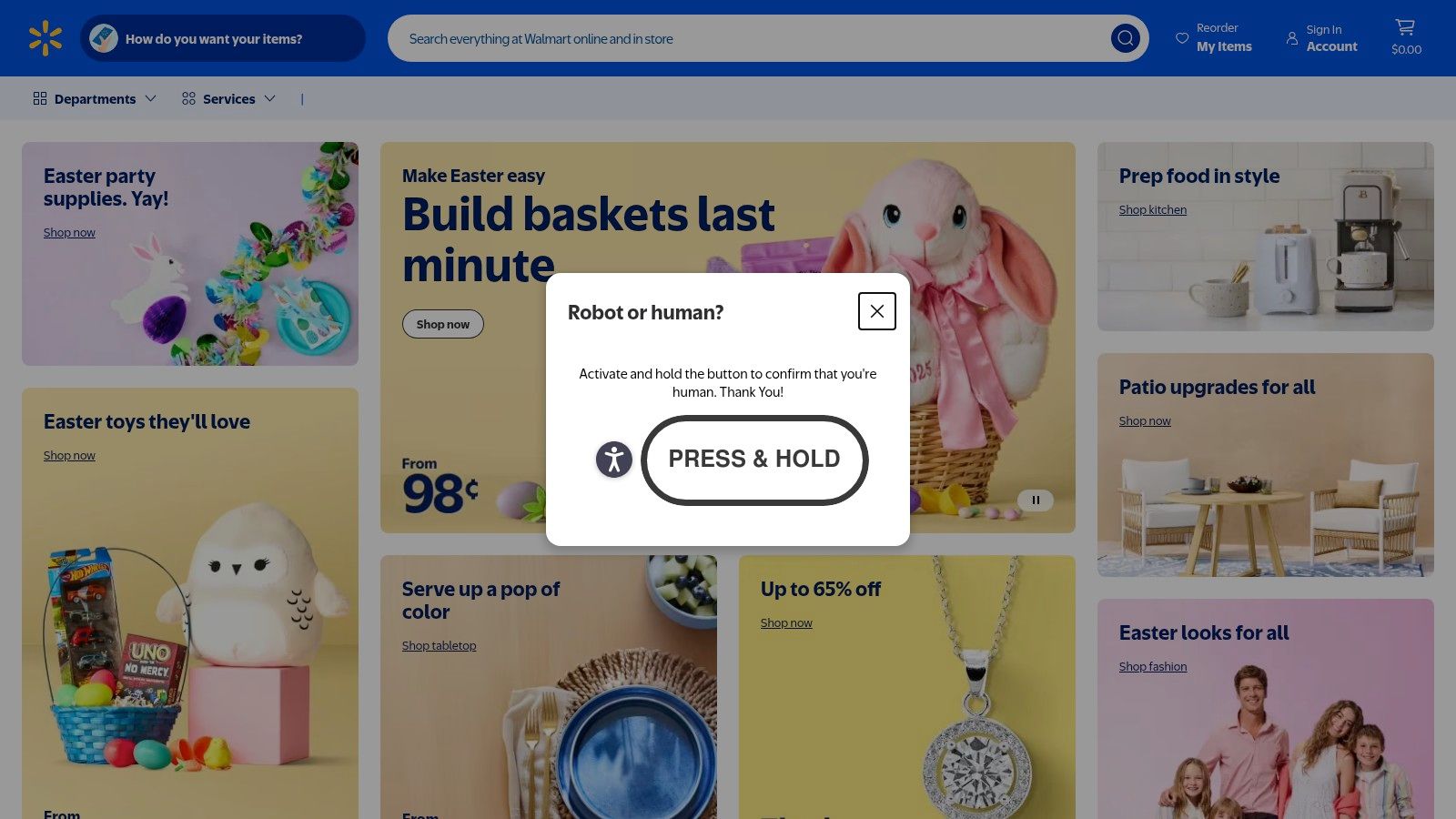
For Shopify merchants, integrating with Walmart Marketplace can open doors to millions of new customers. While Amazon offers a massive third-party seller network, Walmart’s emphasis on a curated marketplace can be advantageous. It often means less competition and potentially higher visibility for quality products. This is particularly beneficial for businesses struggling to stand out amidst the crowded Amazon marketplace.
Features and Benefits:
- Omnichannel Retail Strategy: Walmart seamlessly blends online and offline shopping, allowing for in-store pickup, returns, and leveraging their physical locations as fulfillment centers. This provides a significant advantage in terms of delivery speed and convenience, potentially outpacing Amazon in specific regions.
- Walmart+: While not required, Walmart+ offers benefits similar to Amazon Prime, including free shipping, fuel discounts, and scan-and-go shopping in physical stores. This subscription service can be attractive to frequent Walmart shoppers and can incentivize purchases from your store.
- Extensive Grocery Options: Walmart’s robust grocery business makes it a strong contender for businesses selling food products. Their grocery delivery and pickup services are well-established, catering to the growing demand for online grocery shopping.
- Third-Party Marketplace: Walmart Marketplace offers an alternative platform for Shopify sellers to list and sell their products. While still developing, it presents an opportunity to diversify beyond Amazon and potentially tap into a less saturated market.
Pros:
- Extensive Physical Store Network: The sheer number of Walmart stores allows for convenient and often immediate pickup options for customers, a feature not readily available with online-only retailers like Amazon.
- Competitive Pricing: Walmart is known for its generally lower prices on everyday items, making it a budget-friendly option for shoppers. This price-conscious customer base can be a significant advantage for Shopify merchants offering competitively priced products.
- No Membership Fee (for basic services): Unlike Amazon Prime, accessing core services like pickup and basic shipping options doesn't require a membership, potentially attracting a wider range of customers.
- Strong Grocery Presence: For food-related businesses, Walmart’s focus on fresh groceries and established delivery/pickup infrastructure provides a solid foundation for reaching online grocery shoppers.
Cons:
- Smaller Product Selection: While extensive, Walmart's online catalog is still smaller than Amazon's, potentially limiting reach for niche products.
- Developing Marketplace Ecosystem: Walmart's third-party marketplace is not as mature as Amazon's, potentially presenting challenges in terms of tools, features, and seller support.
- Website/App Experience: While improving, Walmart's online experience isn't as polished as Amazon's, potentially impacting user navigation and conversion rates.
- Fewer Exclusive Products: Walmart offers fewer exclusive products and original content compared to Amazon, potentially limiting opportunities for unique product offerings.
Website: https://www.walmart.com
Implementation Tips for Shopify Merchants:
- Focus on competitive pricing: Leverage Walmart's reputation for value by offering competitive pricing.
- Optimize product listings: Ensure your product descriptions and images are high-quality to compete effectively on the marketplace.
- Leverage Walmart's fulfillment options: Explore options like in-store pickup and two-day shipping to enhance customer convenience.
- Monitor performance: Track your sales and customer feedback to identify areas for improvement and optimize your Walmart Marketplace strategy.
Walmart represents a powerful alternative to Amazon for both customers and Shopify merchants. Its omnichannel approach, competitive pricing, and developing marketplace provide a compelling opportunity for businesses seeking growth and diversification beyond the Amazon ecosystem. While still growing and refining its online platform, Walmart's potential makes it a key player to watch and a viable alternative for reaching a wider customer base.
2. eBay
eBay stands as one of Amazon's most enduring rivals, providing a sprawling online marketplace that connects buyers and sellers worldwide. Instead of Amazon's increasingly first-party focused inventory model, eBay prioritizes being a platform for third-party sellers. While it pioneered the online auction format, eBay now offers a substantial number of fixed-price listings, much like traditional e-commerce sites. Its key differentiator lies in its unique inventory: collectibles, used goods, and vintage items that are often hard to come by on Amazon. This makes it a valuable resource for Shopify merchants looking to source unique products, understand competitor pricing, or even expand their own sales channels.
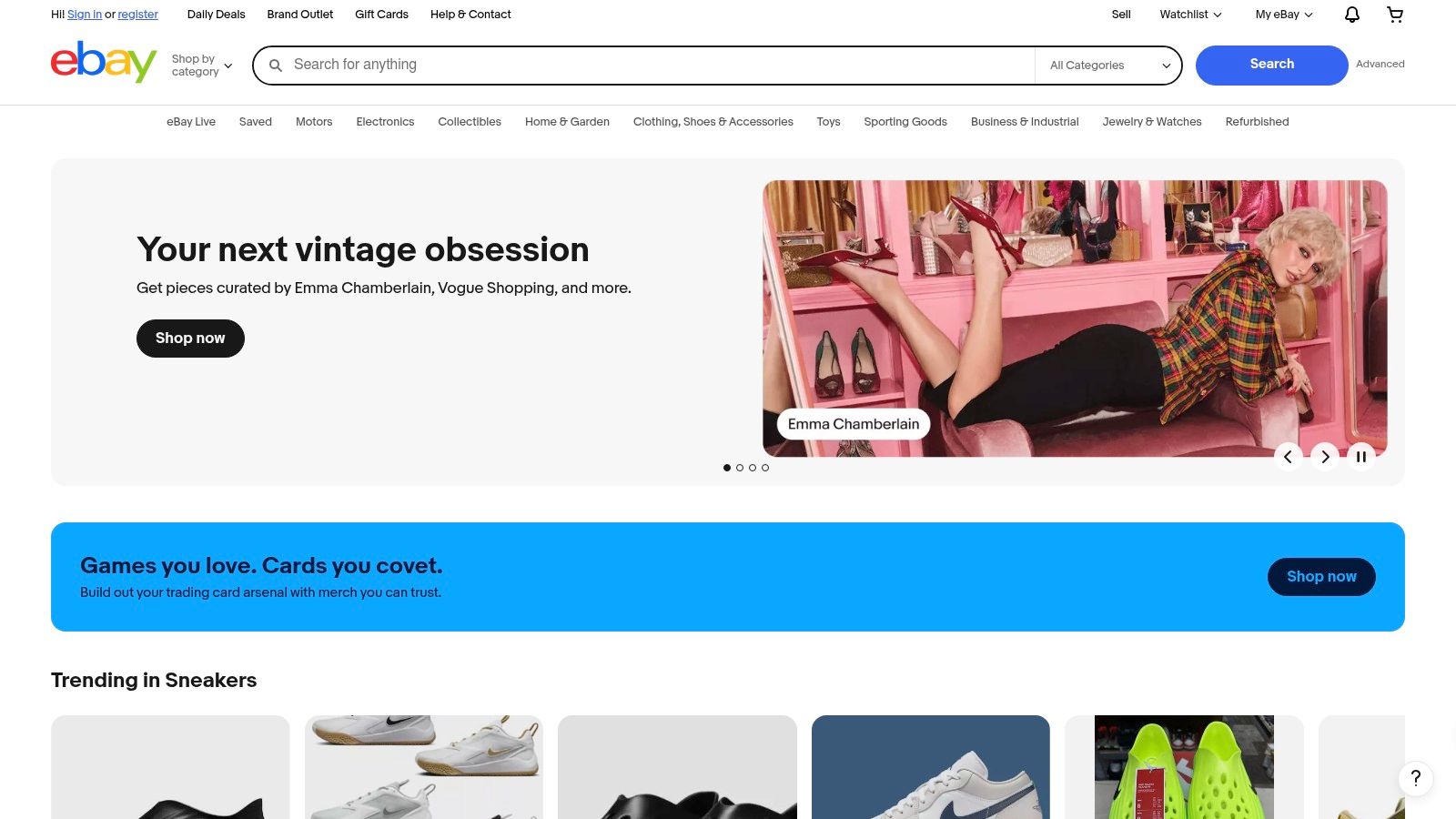
For Shopify store owners, eBay presents several compelling use cases. You can leverage it to research trending products and pricing strategies, especially within niche markets. Sourcing unique, vintage, or used items to complement your existing Shopify catalog is another powerful application. You can even use eBay as an additional sales channel, diversifying your reach and tapping into a massive existing customer base. Thinking about improving your own ecommerce sales? Learn more about eBay and how it fits within a multi-channel strategy.
eBay offers both auction-style and fixed-price purchasing, catering to various selling strategies. Its global marketplace connects international buyers and sellers, opening doors to a broader audience than you might reach solely through your Shopify store. For high-value transactions, eBay's authenticated luxury item program provides added security and trust. Additionally, buyer protection policies and a money-back guarantee offer peace of mind for both buyers and sellers.
Features:
- Auction-style and fixed-price purchasing options
- Extensive selection of rare, collectible, and used items
- Global marketplace connecting international buyers and sellers
- Authenticated luxury item program
- Buyer protection policies and money-back guarantee
Pros:
- Often features unique items not available on Amazon
- Better platform for person-to-person sales and used goods
- No subscription required to access all features (selling fees apply)
- Opportunity to negotiate prices through best offers
Cons:
- Less consistent shipping speeds and policies compared to Amazon
- Variable seller quality and customer service
- Limited direct fulfillment services compared to Amazon FBA
- Higher risk of counterfeit items in some categories, requiring vigilance
Website: https://www.ebay.com
eBay earns its place on this list because it provides a distinct alternative to Amazon, specializing in areas where Amazon falls short. For Shopify merchants, it offers a powerful tool for product research, sourcing, and even expanding sales channels. While navigating the platform requires awareness of its nuances regarding seller quality and shipping inconsistencies, the potential rewards in terms of unique inventory and access to a global market are significant.
3. Alibaba/AliExpress
Alibaba Group, a massive e-commerce ecosystem originating from China, presents a powerful alternative to Amazon, especially for Shopify merchants seeking product sourcing, competitive pricing, and access to a vast global marketplace. While the Alibaba group encompasses several platforms, AliExpress specifically caters to smaller businesses and individual consumers looking to buy directly from manufacturers. This direct access is a key differentiator and a primary reason AliExpress earns its spot on this list of Amazon competitors. It opens doors for Shopify store owners to discover unique products, negotiate better deals, and potentially increase profit margins.
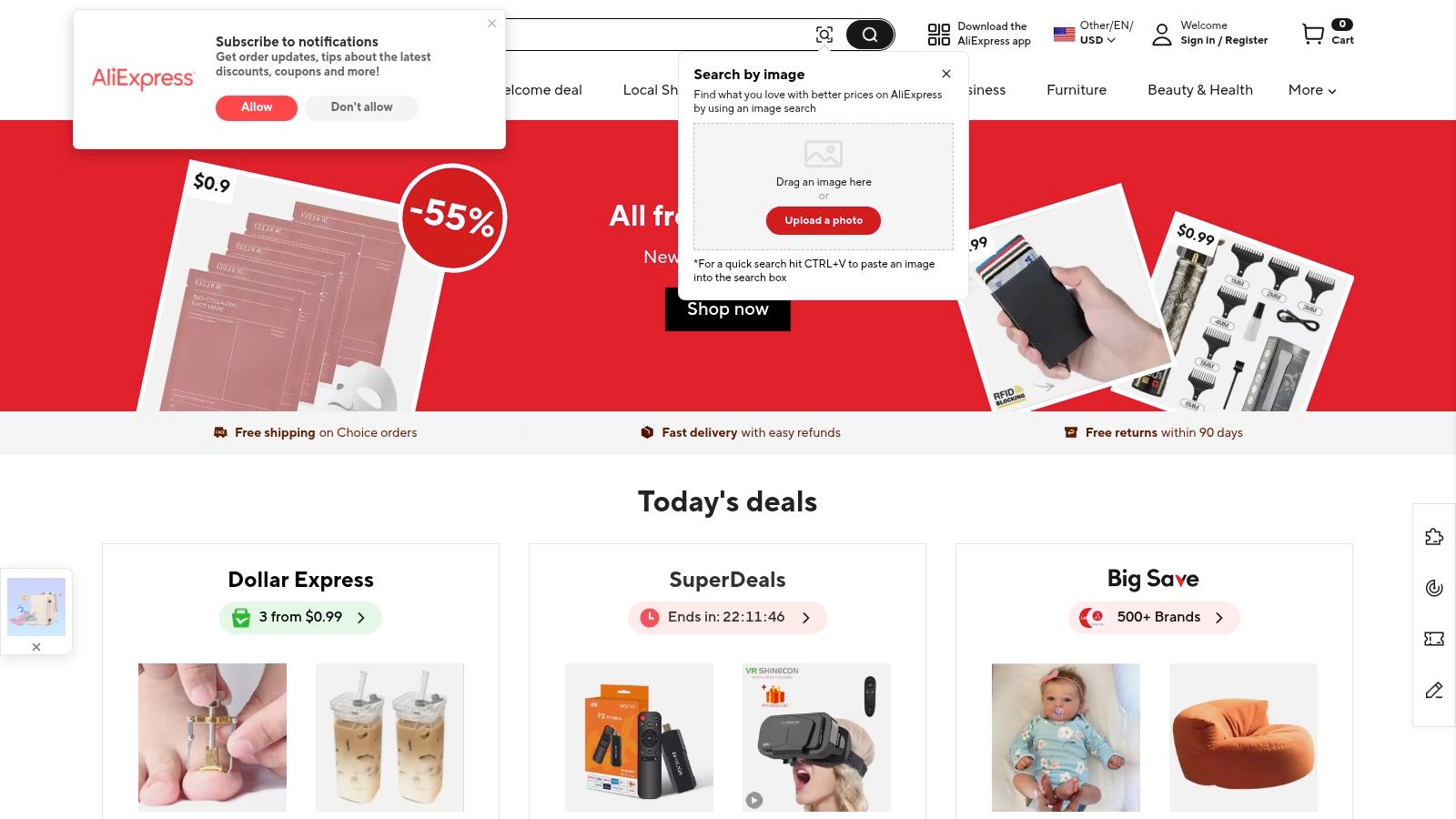
For Shopify entrepreneurs, AliExpress acts as a virtual goldmine for product sourcing. Imagine finding trending products not readily available on Amazon or sourcing products at significantly lower prices to boost your profit margins. This is the power of AliExpress. You can find everything from electronics and accessories to clothing and home goods. Furthermore, the platform's bulk purchasing options allow for economies of scale, particularly beneficial for scaling Shopify businesses. The integrated Alipay payment system streamlines transactions, although understanding its nuances is crucial.
Features and Benefits for Shopify Merchants:
- Direct Access to Manufacturers: Bypass intermediaries and connect directly with Chinese suppliers, enabling better price negotiation and potential for white-labeling products for your Shopify store.
- Competitive Pricing: Source products at significantly lower costs compared to Amazon, leading to higher potential profit margins for your store.
- Wide Product Selection: Discover unique and trending products, often not available in Western markets, giving your Shopify store a competitive edge.
- Bulk Purchasing: Leverage economies of scale by ordering in bulk, further reducing costs and improving profitability.
- Integrated Alipay: Streamlined and secure payment processing specifically designed for international transactions.
Pros:
- Significantly lower prices on a wide range of products.
- Access to unique and trending products.
- No subscription or selling fees.
- Strong selection of electronics, accessories, and manufactured goods.
Cons:
- Longer shipping times (often several weeks) can impact customer satisfaction. Consider factoring this into your shipping policies and set clear expectations with your Shopify customers.
- Quality control can be inconsistent across different suppliers. Always order samples before committing to large orders for your Shopify store.
- Returns can be more complicated compared to Amazon. Establish a clear return policy for your Shopify store that addresses these potential complexities.
- Higher risk of counterfeit products requires diligent supplier vetting. Research suppliers thoroughly and check reviews before committing.
Implementation Tips for Shopify Merchants:
- Thorough Supplier Research: Use AliExpress's supplier ratings and reviews to identify reputable manufacturers.
- Order Samples: Always order samples before placing bulk orders to assess quality and ensure alignment with your brand standards.
- Communicate Clearly with Suppliers: Use a translation tool if needed to ensure clear communication about product specifications and shipping details.
- Factor in Shipping Time: Set realistic expectations for shipping times on your Shopify store to avoid customer dissatisfaction.
- Understand Import Regulations: Familiarize yourself with import regulations for your country to avoid delays and potential issues with customs.
Website: https://www.aliexpress.com
AliExpress provides a compelling alternative for Shopify merchants seeking diverse product sourcing options and competitive pricing. While navigating the platform requires some due diligence regarding supplier selection, shipping times, and quality control, the potential rewards for your Shopify business can be significant. By leveraging AliExpress strategically, you can unlock access to a vast global marketplace, differentiate your product offerings, and ultimately boost your bottom line.
4. Target
Target stands out as a compelling alternative to Amazon, especially for Shopify merchants seeking inspiration or a different shopping experience. It carves its niche by offering a more curated, design-focused selection of products, bridging the gap between budget-friendly giants like Walmart and higher-end retailers. This focus on style and quality makes it a valuable resource for Shopify sellers looking to understand current trends and product presentation strategies. Think of it as a real-world, accessible mood board for your online store.
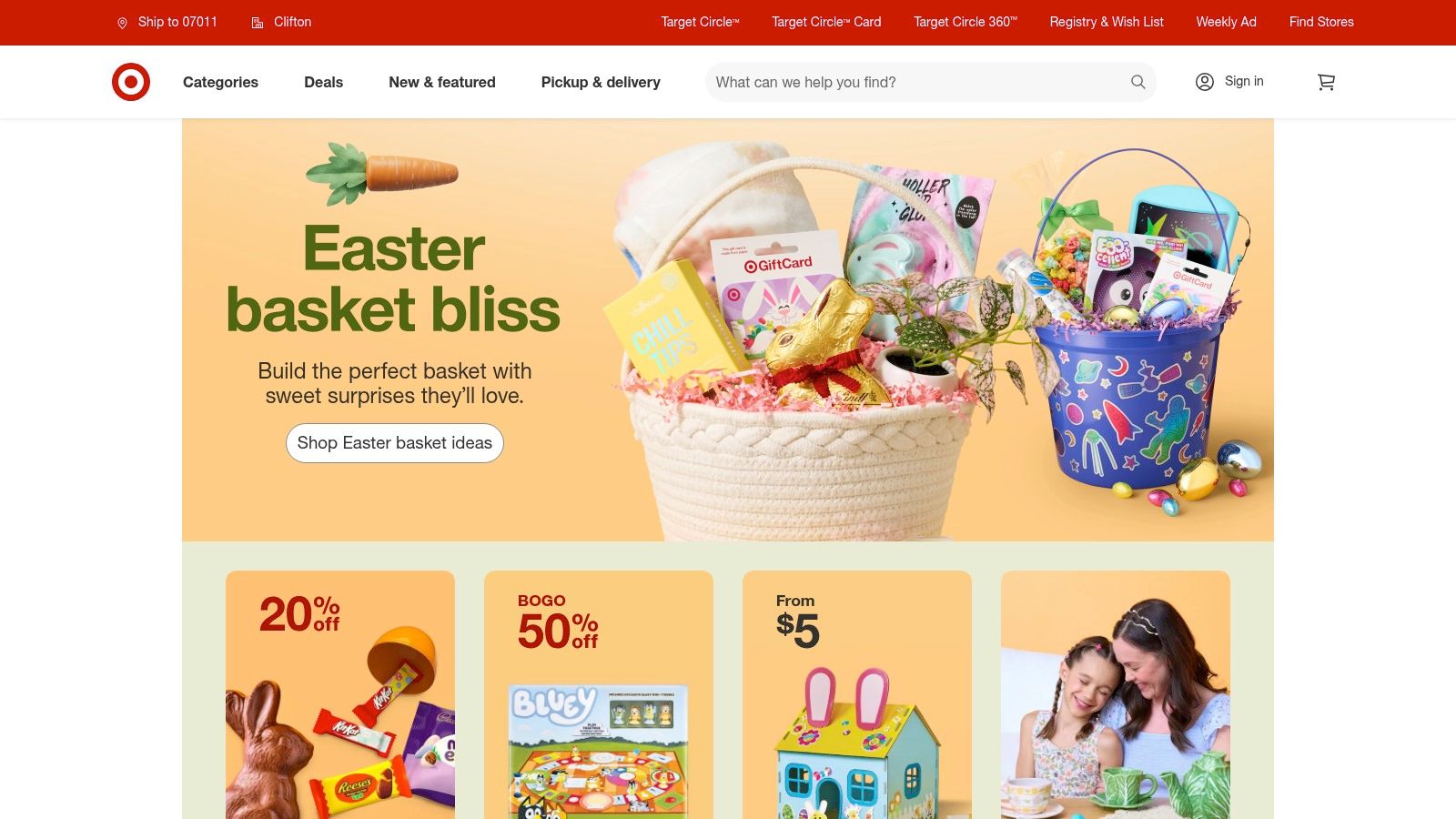
Target's strength lies in its curated assortment of home goods, apparel, and essentials. Instead of overwhelming choice, it presents a refined selection, which can be particularly insightful for Shopify stores specializing in similar niches. Observing Target's product displays, both online and in-store, can provide valuable lessons in merchandising and visual storytelling. Their private label brands, like Good & Gather (grocery) and Threshold (home décor), also offer a benchmark for quality and pricing for Shopify businesses developing their own product lines.
For Shopify merchants exploring omnichannel strategies, Target's seamless integration of online and offline shopping offers a prime example. Their "Drive Up" and in-store pickup options, coupled with same-day delivery via Shipt, demonstrate how to cater to customer preferences for convenience and immediacy. While implementing such services may require significant investment, Target's model provides a roadmap for building a cohesive and efficient fulfillment system.
Features:
- Curated selection of home goods, apparel, and essentials
- Same-day delivery through Shipt service
- Drive-up and in-store pickup options
- Exclusive designer collaborations and in-house brands
- Target Circle loyalty program offering personalized deals
Pros:
- More curated, design-focused selection than Amazon
- Seamless integration between online and in-store shopping
- Strong private label brands with a good quality-to-price ratio
- Same-day fulfillment options through store network
Cons:
- Significantly smaller product selection than Amazon
- Higher prices on some everyday items compared to Walmart and Amazon
- Less developed marketplace for third-party sellers (less relevant to Shopify merchants)
- Fewer services bundled into membership offerings (although Target Circle offers valuable personalization features)
Website: https://www.target.com
Implementation/Setup Tips for Shopify Merchants (Inspired by Target):
- Curate your product selection: Don't try to be everything to everyone. Focus on a specific niche and offer a carefully chosen selection of high-quality products that resonate with your target audience.
- Prioritize visual merchandising: Invest in high-quality product photography and create compelling product descriptions. Study Target's website and store layouts for inspiration.
- Explore partnerships and collaborations: Consider collaborating with influencers or other brands to expand your reach and offer unique products.
- Offer flexible fulfillment options: While same-day delivery might not be immediately feasible, explore options like local delivery or in-store pickup if you have a physical presence.
- Build a loyalty program: Offer exclusive deals and personalized recommendations to reward repeat customers and build brand loyalty, taking cues from Target Circle's personalized approach.
By studying Target's strategies, Shopify merchants can gain valuable insights into building a successful online business that prioritizes quality, design, and customer experience. While replicating their entire model might not be feasible for smaller businesses, incorporating elements of their approach can significantly enhance brand identity and customer satisfaction.
5. Shopify
Shopify isn't a direct competitor to Amazon in the sense of being a marketplace where consumers browse and buy products. Instead, it empowers businesses to create their own online stores, offering a powerful, decentralized alternative to selling within Amazon's ecosystem. This makes it a strategic competitor, vying for the loyalty of merchants looking to establish their own brand presence and control their customer relationships. Essentially, Shopify provides the tools and infrastructure for businesses to build their own "mini-Amazons."

Think of it this way: selling on Amazon is like renting a stall in a bustling flea market. You benefit from the existing foot traffic, but you're also subject to the market's rules and fees, and it’s hard to stand out from the crowd. Shopify, on the other hand, is like building your own boutique. You have complete control over the design, branding, and customer experience, but you're responsible for attracting your own customers.
Shopify offers various pricing plans, starting from $5/month for the "Starter" plan (which allows selling through social media and messaging apps) up to $299/month for the "Advanced" plan, which offers advanced reporting and lower transaction fees. Shopify Plus, designed for enterprise-level businesses, provides custom pricing based on individual needs. While no specific technical requirements exist beyond a computer and internet access, some familiarity with web design and e-commerce principles is helpful, although not strictly necessary thanks to Shopify’s user-friendly interface.
Compared to platforms like BigCommerce and WooCommerce, Shopify stands out with its extensive app ecosystem, providing nearly limitless customization possibilities. Need to integrate email marketing? There's an app for that. Want to offer personalized product recommendations? There's an app for that too. This flexibility makes Shopify suitable for businesses of all sizes, from solo entrepreneurs to large corporations.
Setting up a Shopify store is relatively straightforward. You choose a theme, customize the design, add your products, configure payment processing through Shopify Payments (or a third-party provider), and set up shipping options. You can even integrate your store with other sales channels like social media platforms and online marketplaces, enabling multichannel selling. Learn more about Shopify and how it can help you expand your reach.
Pros:
- Branded Experience: Craft a unique online presence that reflects your brand identity and fosters direct customer relationships.
- Data Control: Own your customer data and leverage it for targeted marketing campaigns.
- Scalability: Shopify grows with your business, offering plans for every stage of growth.
- Lower Fees: Compared to Amazon's commission structure, Shopify's transaction fees can be significantly lower.
Cons:
- More Management: Requires more hands-on effort in terms of store setup, marketing, and customer service.
- Traffic Generation: You are responsible for driving traffic to your store, unlike Amazon's built-in customer base.
- Fulfillment: While the Shopify Fulfillment Network is improving, it's still not as comprehensive as Amazon's FBA.
- Customer Acquisition: You'll need to invest time and resources in marketing and advertising to attract customers.
Shopify earns its spot on this list by offering a viable alternative to selling on Amazon, giving businesses greater control over their brand and customer relationships. While it requires more effort, the potential rewards in terms of brand building and profitability make it a compelling option for businesses looking to chart their own e-commerce course. The website, https://www.shopify.com, provides further details and resources for getting started.
6. Best Buy
Best Buy carved its niche as a formidable Amazon competitor by focusing on what Amazon can't easily replicate: the in-person experience, especially for complex electronics and appliances. While Amazon excels at vast selection and quick delivery, Best Buy provides a consultative sales approach coupled with expert technical support, making it a preferred choice for consumers who value hands-on assistance. Think of purchasing a high-end television: Do you simply want it shipped to your door, or would you prefer expert advice on setup, calibration, and potentially even installation? This is where Best Buy shines, targeting customers who prioritize service and support over rock-bottom prices. For Shopify merchants selling electronics or appliances, understanding Best Buy's strategy offers valuable insights into catering to a customer base seeking expert advice and tailored solutions.
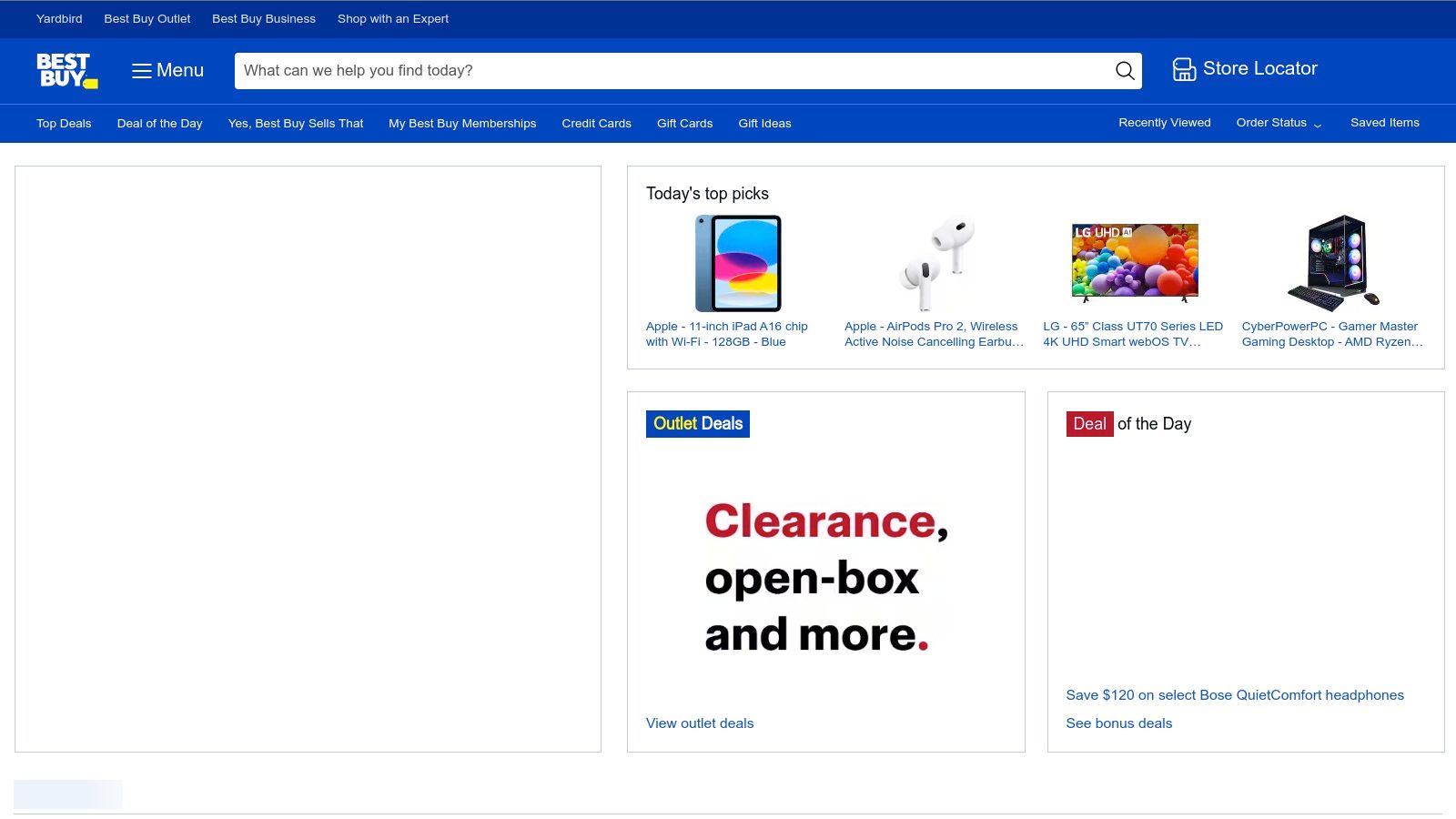
Best Buy’s omnichannel approach blends online convenience with its physical store network. You can browse and purchase online, opting for in-store pickup or curbside delivery, leveraging the immediacy of local stores. This "showrooming" strategy allows customers to examine products physically before committing to a purchase, a significant advantage over online-only retailers. This model presents a challenge for Shopify merchants but also an opportunity – consider partnering with local businesses or exploring pop-up shops to bridge the online-offline gap.
Key Features and Benefits:
- Geek Squad: This technical support service provides installation, setup, repair, and troubleshooting for a range of electronics and appliances. While pricing varies depending on the service, Geek Squad represents a significant value proposition for customers and a differentiator against Amazon. Shopify merchants can explore partnerships with local tech support providers to offer similar value-added services.
- Price Match Guarantee: Best Buy matches prices from major competitors, including Amazon, minimizing the price advantage Amazon often enjoys. This allows customers to get the benefits of Best Buy's services without paying a premium. Consider offering price-matching within your Shopify store to remain competitive.
- My Best Buy Membership: This loyalty program offers exclusive deals, extended return periods, and free shipping on most items. While there are no specific technical requirements for joining, it adds another layer to Best Buy's customer retention strategy. A well-structured loyalty program on your Shopify store can similarly foster customer loyalty.
- In-Store Pickup & Curbside Delivery: These fulfillment options provide convenience and speed, leveraging the physical store network. Implementing similar click-and-collect options can be a game-changer for Shopify businesses with physical locations.
Pros:
- Expert technical advice and support: A significant advantage over Amazon, especially for complex product categories.
- Immediate access to products: The extensive store network provides instant gratification for customers.
- Tangible shopping experience: The ability to see and test products in person is a major draw.
Cons:
- Limited product range: Focus primarily on electronics and appliances.
- Potentially higher prices: While price matching exists, base prices can be higher than Amazon.
- Less developed marketplace: Smaller third-party seller ecosystem than Amazon.
Website: https://www.bestbuy.com
Best Buy's success illustrates the importance of a differentiated strategy in the face of Amazon's dominance. For Shopify merchants, the key takeaway is the value of focusing on specific customer needs and offering services that Amazon struggles to replicate. Whether it’s expert advice, personalized service, or unique fulfillment options, finding your niche and building a strong brand identity are crucial for competing in today's e-commerce landscape.
7. Costco
Costco stands as a compelling alternative to Amazon, particularly for Shopify merchants looking to source inventory or for personal bulk purchases. Its membership-based wholesale model focuses on providing high-quality products in bulk at competitive prices. While it might not offer the sheer variety of Amazon, Costco's curated selection and stringent quality control often translate to better value and a superior customer experience, especially for specific product categories. This makes it an excellent option for businesses needing consistent quality in bulk, or individuals and families who can benefit from bulk buying.

Practical Applications for Shopify Merchants:
- Sourcing Inventory: Costco can be a valuable resource for Shopify merchants selling physical products, especially those focusing on a smaller, curated selection. Purchasing in bulk can significantly reduce per-unit costs, increasing profit margins. This is especially true for non-perishable goods or items with long shelf lives. Consider Costco for sourcing items like kitchenware, home goods, electronics accessories, or even certain food items for curated gift baskets or subscription boxes.
- Packaging Supplies: The cost of shipping and packaging can quickly eat into profits. Costco's bulk pricing on boxes, packing tape, bubble wrap, and other shipping supplies can offer substantial savings.
- Office Supplies: From printer paper and ink to coffee and snacks for the team, running a Shopify store requires various office supplies. Costco's bulk pricing on these everyday essentials can help minimize overhead costs.
Pricing and Membership:
Costco operates on a membership basis. The basic Gold Star membership starts at $60 annually, while the Executive Membership costs $120 per year and offers 2% annual rewards (up to $1,000) on eligible Costco purchases. The Executive Membership might be worthwhile for Shopify merchants consistently sourcing inventory through Costco.
Features and Benefits:
- Bulk Purchasing: Costco's core strength lies in offering bulk discounts. This translates to significant cost savings, particularly for frequently purchased items.
- High-Quality Kirkland Signature Products: Costco's private label, Kirkland Signature, is renowned for its quality and value, often rivaling or surpassing name-brand counterparts.
- Curated Selection: While not as vast as Amazon, Costco's curated selection simplifies the buying process and focuses on high-demand items.
- Additional Member Services: Beyond retail, Costco offers additional services like travel deals, auto programs, and insurance, which could offer further value for members.
Pros:
- Lower Prices: Costco often undercuts Amazon on bulk purchases and specific product categories.
- Higher Quality Standards: Costco maintains stricter quality standards than many competitors, including Amazon's third-party marketplace.
- Generous Return Policy: Costco is known for its hassle-free return policy.
- Excellent Customer Service: Costco consistently receives high marks for customer service.
Cons:
- Membership Fee: The annual membership fee can be a barrier for occasional shoppers.
- Limited Product Selection: Costco's curated approach means a significantly smaller selection than Amazon's vast catalog.
- Less Convenient for Small Purchases: Buying in bulk might not be suitable for all Shopify merchants or individual shoppers.
- Slower Shipping: Costco's online delivery options and shipping speeds generally lag behind Amazon Prime.
Website: https://www.costco.com
Costco earns its place on this list by offering a distinct value proposition compared to Amazon. While it might not be suitable for all Shopify businesses or individual needs, its focus on bulk buying, quality products, and competitive pricing makes it a strong contender, especially for sourcing inventory and specific product categories. Weighing the pros and cons against your specific needs is crucial to determine if Costco is the right fit for your business or personal shopping.
8. Wayfair
Wayfair stands out as a major Amazon competitor by focusing exclusively on the home goods, furniture, and decor market. If your Shopify store operates in this niche, Wayfair presents both a challenge and a learning opportunity. Instead of competing directly with their massive product catalog, consider how Wayfair’s specialized approach can inform your own strategies. They carve out a distinct space within the broader e-commerce landscape, proving that specialization can be a powerful differentiator. For Shopify merchants looking to make a mark in the home goods sector, studying Wayfair's tactics is crucial. They demonstrate how a focused approach, combined with the right tools and services, can attract and retain customers looking for curated home solutions.
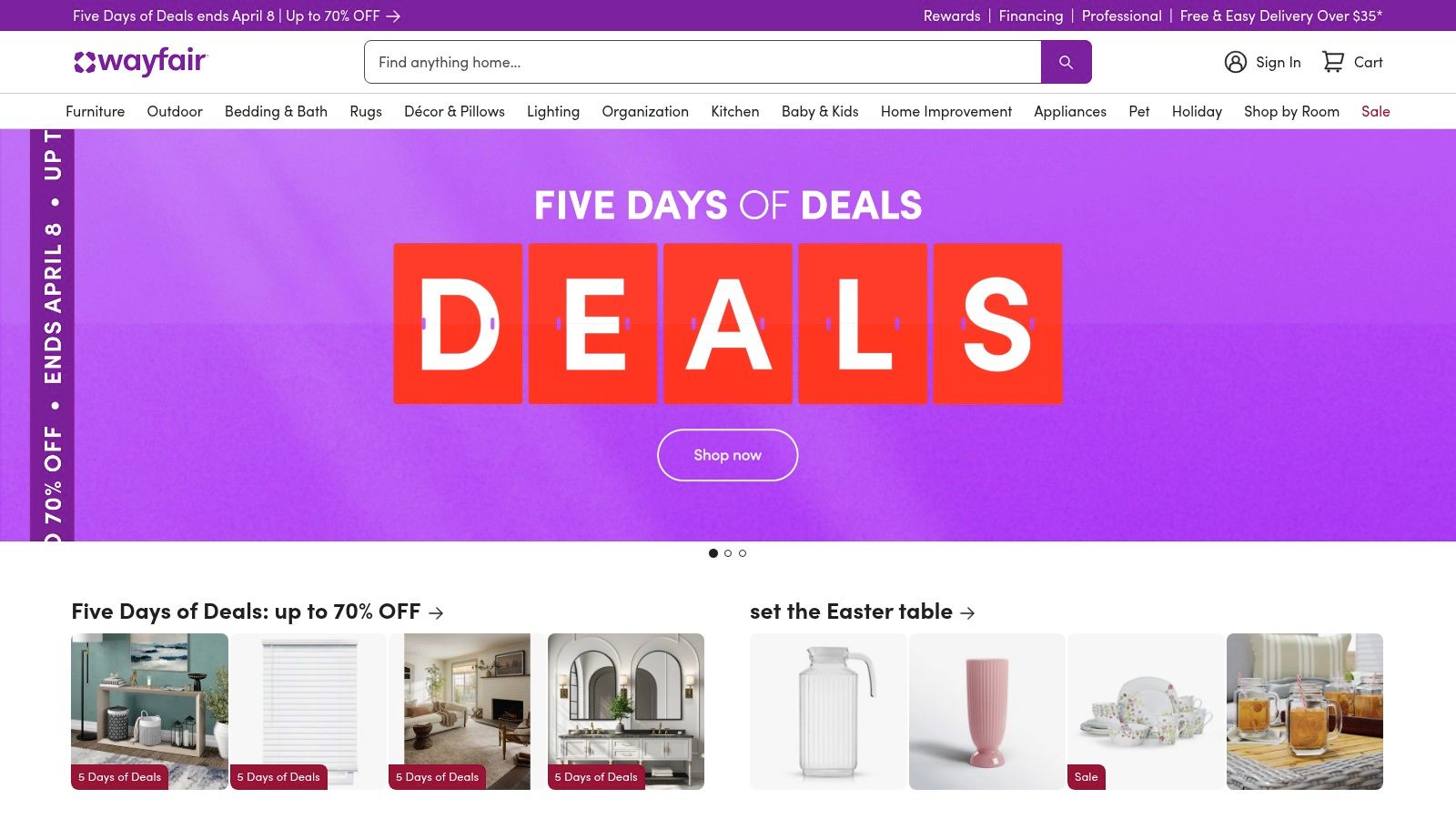
Wayfair's success lies in its comprehensive selection of over 22 million products from 16,000 suppliers, dwarfing Amazon's offerings in these specific categories. This depth, combined with specialized tools and services, makes it a go-to destination for home-related purchases. While Amazon offers a broader range of products, Wayfair excels in providing a curated experience tailored to the needs of furniture and decor shoppers.
Features and Benefits:
- Specialized Product Focus: Wayfair's laser focus allows them to offer a far deeper selection of furniture, decor, and home improvement products than general marketplaces like Amazon. This specialization resonates with customers seeking expert curation and a wide variety of options within their niche.
- Visualization Tools: Wayfair's room visualization tools and 3D models give customers a much clearer picture of how furniture will look in their own homes. This addresses a major pain point in online furniture shopping and provides a significant advantage over competitors lacking such technology. Shopify store owners should consider integrating similar visualization tools to enhance their customer experience.
- Design Services: For customers overwhelmed by choices, Wayfair offers design services and idea boards, providing personalized guidance and simplifying the design process. This value-added service fosters customer loyalty and positions Wayfair as more than just a retailer, but a design partner.
- Customization and Filtering: Wayfair's robust filtering system allows customers to refine searches based on specific criteria, including dimensions, style, material, and price. This level of granularity is critical for furniture shopping and enhances the overall user experience.
- White-Glove Delivery: For bulky furniture items, Wayfair's white-glove delivery service offers premium delivery and assembly options. This alleviates a significant logistical hurdle for customers and positions Wayfair as a convenient, full-service provider.
Pros:
- More comprehensive selection in home categories than Amazon
- Specialized tools and filters designed for home shopping
- Better visualization features for furniture and home goods
- More detailed product information for home category items
Cons:
- Limited to home-related categories only
- Variable quality across different suppliers (a challenge for any multi-vendor platform)
- Shipping times can sometimes be longer than Amazon Prime
- Assembly is required for many furniture items
Website: https://www.wayfair.com
Key Takeaway for Shopify Merchants: Wayfair’s success demonstrates the power of specialization. By focusing on a specific niche and providing tailored tools and services, Shopify merchants can differentiate themselves from larger marketplaces and build a loyal customer base. Consider how you can incorporate some of Wayfair’s strategies, such as enhanced visualization tools or specialized filtering options, to improve the shopping experience within your own niche.
9. Newegg
Newegg carves out a distinct space in the e-commerce landscape, offering a powerful alternative to Amazon, particularly for Shopify merchants dealing in technology products or looking to expand into that niche. While Amazon is a generalist giant, Newegg focuses sharply on electronics, computer hardware, and components, making it a valuable resource for specific customer segments.
Why Newegg Deserves Its Place:
Newegg isn't trying to be everything to everyone. Its strength lies in its specialization. Think of it as the go-to destination for tech enthusiasts, gamers, and PC builders – a demographic that often demands more technical details and specialized components than Amazon typically offers. This focus allows Newegg to cater to a loyal customer base that appreciates its curated selection and expert knowledge. For Shopify merchants selling related products, leveraging Newegg can open doors to this dedicated market.
Features and Benefits:
- Deep Dive into Tech: Newegg's core competency is its comprehensive selection of computer components, electronics, and gaming gear. From motherboards and GPUs to pre-built gaming PCs and peripherals, they often stock items you won't find on Amazon, or at least not with the same level of detailed specifications.
- PC Building Paradise: Newegg provides tools specifically designed for PC builders. Compatibility checkers help ensure chosen components work seamlessly together, simplifying the often complex process of building a custom PC. This specialized service is a major draw for this customer segment.
- Newegg Premier: This membership program offers free and expedited shipping, exclusive deals, and premium customer service. While it involves a membership fee, it can be beneficial for frequent Newegg shoppers and businesses.
- Technical Expertise: Newegg's customer service and support often include staff with a deeper understanding of technical specifications. This is a key differentiator from Amazon, where general customer service representatives may not possess the same level of product knowledge.
- Marketplace Platform: Similar to Amazon, Newegg allows third-party sellers to list products on its platform. This creates an opportunity for Shopify merchants to expand their reach and tap into Newegg's tech-focused audience.
Pros:
- More comprehensive selection of computer components than Amazon.
- Better technical specifications and details for technology products.
- Strong community of reviews from tech enthusiasts.
- Specialized tools for PC builders and gamers.
Cons:
- Limited selection outside of technology categories.
- Fewer fulfillment centers leading to potentially slower shipping in some areas.
- Less intuitive user interface than Amazon.
- Smaller marketplace with fewer third-party sellers than Amazon.
Implementation/Setup Tips for Shopify Merchants:
While there isn't direct integration between Shopify and Newegg like there is with Amazon, you can still leverage Newegg's marketplace. This typically involves manually creating listings on Newegg, managing inventory separately, and fulfilling orders through your existing Shopify fulfillment processes or exploring Newegg's fulfillment options.
Comparison with Amazon:
Newegg shines where Amazon falls short: in-depth technical specifications and a vast selection of niche computer components. Amazon excels in its broader selection, massive marketplace, and streamlined user experience. Choosing between the two depends on your specific product offerings and target audience.
Website: https://www.newegg.com
In conclusion, Newegg presents a valuable opportunity for Shopify merchants looking to reach tech-savvy consumers. Its specialized focus, technical expertise, and dedicated community make it a strong competitor to Amazon in the technology vertical. While it may not be suitable for all businesses, those operating within the electronics and computer hardware space should seriously consider adding Newegg to their sales channels.
10. Etsy
Etsy stands as a compelling alternative to Amazon, especially for Shopify merchants seeking unique product sourcing or inspiration for their own handcrafted goods. Instead of competing directly with Amazon's vast catalog of mass-produced items, Etsy carves its niche by focusing on handmade, vintage, and unique products. This makes it an invaluable resource for Shopify stores looking to differentiate their offerings and cater to customers seeking something special.
Why Etsy Deserves Its Place:
In a world of mass-produced goods, Etsy provides a platform for individuality. It allows Shopify sellers to discover handcrafted items, vintage treasures, and unique supplies that can complement their existing product lines or inspire new creations. It also offers a model for building a community around a brand, something that many Shopify merchants strive for.
Features and Benefits:
- Marketplace for the Unique: Etsy's core strength is its focus on handmade, custom, and vintage items. This offers Shopify stores a source for products they won't find on Amazon, enabling them to curate a more distinctive brand identity.
- Direct Seller Communication: Etsy facilitates direct communication between buyers and sellers, making it ideal for sourcing custom-made items or collaborating with artisans for exclusive products. This can be a great resource for Shopify stores looking to offer personalized options to their customers.
- Personalization Options: From custom-engraved jewelry to personalized pet portraits, Etsy offers a wide array of personalization options across numerous product categories. This aligns with the growing consumer demand for bespoke products and provides Shopify sellers with ideas and potential suppliers for personalized offerings.
- Support for Small Businesses: Etsy champions small businesses and independent creators. This resonates with the Shopify ecosystem, which is largely built on the success of small and medium-sized enterprises.
- Gift Registry and List Creation: While less relevant for Shopify merchants directly, these tools can inspire similar functionality on Shopify stores, enhancing the customer experience.
Pros:
- Access to Unique Inventory: Discover one-of-a-kind items not available on Amazon, adding a distinctive touch to your Shopify store.
- Supporting Independent Creators: Source products ethically and contribute to the success of small businesses.
- Extensive Customization: Offer personalized products to your customers through collaborations with Etsy sellers.
Cons:
- Higher Prices: Handmade and vintage items often come with a premium price tag compared to mass-produced alternatives.
- Longer Production and Shipping Times: Custom orders may require longer lead times, which should be factored into your Shopify store's fulfillment strategy.
- Inconsistent Seller Policies: Varying seller policies and quality standards require careful vetting of potential suppliers.
- Limited Product Categories: While diverse, Etsy focuses on specific niches and may not cover all product types a Shopify merchant might need.
Implementation/Setup Tips for Shopify Merchants:
- Product Sourcing: Use Etsy to find unique products to complement your existing offerings or to inspire new product development. Consider partnering with Etsy sellers to create exclusive items for your Shopify store.
- Market Research: Explore trending products and styles on Etsy to gain insights into consumer preferences and identify potential niche markets. Learn more about Etsy and how it can inspire your own product offerings.
- Customer Experience Inspiration: Observe how Etsy sellers interact with their customers and build community. Implement similar strategies on your Shopify store to foster customer loyalty.
Website: https://www.etsy.com
Amazon Competitors: 10-Point Comparison Guide
| Name | Core Features (✨) | UX / Quality (★) | Value Proposition (💰) | Target Audience (👥) |
|---|---|---|---|---|
| Walmart | Omnichannel retail; Pickup options | Good overall but less refined | Everyday low prices; Broad product range | Families; Everyday shoppers |
| eBay | Auction & fixed-price; Unique collectibles | Varied seller experience | No subscription; Best offers | Bargain hunters; Collectors |
| Alibaba/AliExpress | Direct manufacturer access; Bulk options | Inconsistent quality control | Extremely competitive pricing | International buyers; Small businesses |
| Target | Curated goods; Same-day pickup | Seamless online/in-store integration | Quality brands; Design-focused | Style-conscious shoppers |
| Shopify | All-in-one e-commerce platform; Multichannel | Flexible but requires setup | Greater brand control; Lower fees | Merchants; Entrepreneurs |
| Best Buy | Electronics focus; In-store tech support | Expert assistance; Hands-on testing | Price match guarantee; Consultative service | Tech enthusiasts; Gadget buyers |
| Costco | Membership club; Bulk purchasing; Curated items | Simple in-store experience | Exclusive deals; Superior quality | Value shoppers; Businesses |
| Wayfair | Home goods specialization; Design tools | Detailed product visualization | Extensive selection in home categories | Home decorators; Furniture shoppers |
| Newegg | Tech-centric; PC building tools; Detailed specs | Niche interface; Informative details | Specialized for tech; Competitive components | Gamers; PC builders; Tech enthusiasts |
| Etsy | Handmade & vintage items; Customization options | Personal and community driven | Unique creative products; Artisan support | Art lovers; Collectors; Craft fans |
The Future of E-commerce: Competition and Choice
The e-commerce landscape is brimming with potential, and this list of 10 Amazon competitors showcases the diverse options available for both shoppers and sellers. From established giants like Walmart and eBay to niche marketplaces like Etsy and Newegg, there's a platform for almost every product and target audience. For sellers, understanding the strengths of each platform, such as Target's robust in-store pickup network or Wayfair's focus on home goods, is crucial for maximizing reach and sales. Remember, diversifying your sales channels across multiple platforms can significantly reduce reliance on any single marketplace and build a more resilient business. If Shopify isn't quite the right fit, there are other compelling e-commerce platforms to consider. Check out this list of top Shopify alternatives to find the perfect platform for your business. Source: Discover Best Shopify Alternatives for 2025 from Pickalternative.
The most important takeaway is this: choice empowers both consumers and businesses. As consumers, we benefit from increased competition, specialized offerings, and potentially better prices. As online sellers, we gain the ability to choose the platform that best aligns with our brand, products, and target audience. Exploring and leveraging these alternatives is key to thriving in the dynamic world of online commerce.
Want to boost your visibility and sales across multiple platforms, including these Amazon alternatives? LinkShop helps you optimize your product listings and reach a wider audience, driving more traffic and conversions. Explore LinkShop today and discover how it can help you succeed in the increasingly competitive e-commerce landscape.
